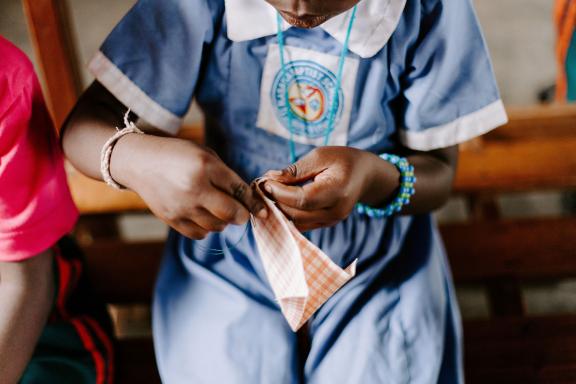Sexual Harassment: Lessons from Two World Bank Projects
The Independent Redress Mechanism (IRM) recently submitted its first Advisory Report, together with the Green Climate Fund (GCF) Secretariat’s management response to the GCF Board. Drawing lessons from two World Bank cases, the Report contained four recommendations on how the GCF can prevent and mitigate sexual harassment in GCF projects and programmes.
Sexual Harassment in Ugandan Road Project
In the shadow of a World Bank road development project in Uganda, a road worker impregnated a 16 year old orphan girl, who then tested HIV positive. Another road worker engaged in sex with a 15 year old girl. Yet another road worker had sex with a 17 year old girl which resulted in her pregnancy, and she had to drop out of school when her baby was six months old. The community was aware of road workers who had sexual relations with at least seven other minor girls. Available evidence suggested that workers subjected schoolgirls to sexual harassment when they were on the way to and back from school, and were lured by offers of small gifts. In almost all of these cases, the workers abandoned the girls and their child. These were some of the factual findings of the World Bank’s Inspection Panel in a January 2016 report. The Inspection Panel is an independent body established by the World Bank to investigate complaints made by people adversely affected by the Bank’s projects.
Confronted with this disturbing and shocking evidence, the World Bank’s management concluded “that there is credible evidence of at least three cases of Project road workers engaging in sexual activity with minors.” The Inspection Panel was not able to confirm the number of cases of child sexual abuse connected to road workers, but postulated that it was possible that this was a widespread problem among the communities along the road.
Gender Based Violence in the DRC
Two years later (2017), the Inspection panel had to address another case involving sexual harassment in a World Bank road development project in the Democratic Republic of the Congo. The Inspection Panel’s report on this case revealed widespread sexual harassment of young girls and gender based violence by workers of road development contractors or the military forces providing security. The report stated that “A 14-year-old girl on her way to fetch water, was abducted by one of the contractor’s employees under the protection of a member of the military forces. She was taken to a nearby bar and raped. The [Inspection] Panel team spoke to both the girl and her mother, who shared that the girl had to leave her village due to the stigma she now faces in her community. The girl also told the Panel that she had heard of at least 10 girls who had undergone the same or similar experience, five of whom she knew personally.”
Three girls below 17 years of age who were students in a skills training center for out-of-school girls, and lived in the center, experienced the same violence. “According to the girls, five of the Contractor’s employees, who were working nearby and were protected by military forces, broke into the building where the girls were lodged and sexually abused them over the course of three weeks. The victims stated that five other girls were brought to the center for paid sexual relations during this time. One of the victims was pregnant at the time the Inspection Panel met her.” The Inspection Panel also learned “that the military forces engaged by the Contractor were asking males seeking employment to procure girls from the community for the Contractor’s staff in exchange for employment. All the girls with whom the Panel met expressed that they would like to go back to school.” Again in response to these allegations, the World Bank’s project team confirmed two cases of sexual harassment involving women working in the kitchen at the contractor’s camp.

The World Bank’s Response – Good Practice
The findings of the Inspection Panel brought to light the failures of the World Bank in identifying, preventing and responding to issues of gender-based violence (“GBV”) and sexual exploitation in these two projects and in the overall approach to project development and appraisal. Significantly, the report highlighted that these were largely caused by deficiencies in the Bank’s implementation of its existing safeguards policies. These two cases and the institutional response of the World Bank have increased the awareness surrounding GBV related matters in the international development sphere. In response, the World Bank’s Board established a Task Force on Gender Based Violence and took a number of steps to improve its due diligence to screen projects for potential GBV. For example, the World Bank began developing a GBV assessment tool to screen projects, which posed and assessed key questions about the local culture, GBV incidents in the locality and country, the influx of outside labour to the project area and the vulnerability of women and girls to GBV. These assessments would tell the project staff whether further assessments were needed on GBV and whether the Bank should put in place protective measures to prevent GBV in the project area.
Other international financial and developmental institutions are learning lessons from the good practices implemented by the World Bank and are also taking steps to improve their due diligence and safeguard systems in this regard. At a practical level, these steps include developing GBV assessment tools and increasing staff capacity on GBV. When GBV is likely to happen, measures are put in place to prevent GBV at the project level by establishing reporting mechanisms and community and project worker awareness raising ahead of time.
Lessons for the Green Climate Fund (GCF)
No allegations of sexual harassment or GBV have been made in any GCF projects. As a relatively young and growing institution, the GCF is in a position to learn from the lessons of others and apply these lessons to its own systems to prevent similar impacts arising in the context of GCF funded projects in the future. Like the World Bank had when it financed the two projects, the GCF already has in place the interim environmental and social safeguards and the Gender Policy and Action Plan - a policy framework which addresses issues relating to Sexual Exploitation, Abuse and Harassment at the project and programme level (PR&PSEAH). The main lesson from the World Bank’s two cases is that while there are safeguard policies in place already, more needs to be done at the ground level to ensure they are effective. The polices must result in a more robust screening of GBV risks, more monitoring of what’s happening on the ground, and more awareness raising among vulnerable communities and project workers. While there are significant institutional, operational and governance differences between the World Bank and the GCF, many of the lessons for preventing and mitigating sexual harassment and gender-based violence at the project and programme level have broad applications across the international development sphere.

IRM’s First Advisory Report
The Independent Redress Mechanism (IRM) of the GCF has a mandate from its Board to provide lessons learned and advice from complaints handled by it and from good international practice. In its first Advisory Report on “Prevention of Sexual Exploitation, Abuse and Harassment in GCF projects or programmes (P&PrSEAH): Learning from the World Bank’s Inspection Panel Cases,” the IRM has focused on lessons to be learned from the World Bank’s experiences and has prepared a report for presentation to its Board. The Advisory report, which has been in the making for over one year, was considered by the Board’s Ethics and Audit Committee in July 2020 and approved for Board presentation as an information document.
The IRM’s main four recommendations to the GCF were to:
- develop a P&PrSEAH risk assessment tool and provide guidance and support to Accredited Entities on developing their own risk assessment tools. Early screening of GCF projects during the design phase would enable the GCF to selectively pay closer attention to those few high risk projects that may need P&PrSEAH preventive and mitigatory measures;
- ensure that the GCF maintains adequate capacity and expertise regarding P&PrSEAH so that GBV issues can be addressed quickly;
- provide for P&PrSEAH expertise and capacity at the project level in high risk projects so that awareness can be raised about such issues and addressed at the ground level; and
- provide guidance to GCF staff and Accredited Entities on P&PrSEAH so that project staff are sensitized to these issues and can identify them early, in a manner that does not overburden developing countries or accredited entities.
The GCF’s Secretariat submitted a positive management response to the IRM’s Advisory Report (found in Annex 1). The Secretariat’s response noted the recommendations and stated that some of them were already being incorporated into the Secretariat’s own efforts to improve implementation of existing safeguards and the GCF’s Policies. These policies included the policy on the prevention and protection from sexual exploitation, sexual abuse, and sexual harassment (SEAH). The Secretariat stated that steps to incorporate the recommendations would be taken in a manner that was appropriate to the GCF and sensitive to the capacities and needs of accredited entities. The GCF’s SEAH policy currently applies to “Covered Individuals” which includes amongst others, GCF Board members, staff and consultants. Later this year, the Secretariat is due to make recommendations to the Board on possible revisions to the SEAH policy with regard to its application to external third parties.
The IRM hopes that its Advisory Report will lead to preventing harms to those most vulnerable and ensuring that GCF projects do not make the same mistakes that the World Bank made and ultimately “do good.” The IRM will work with the Independent Integrity Unit and the GCF Secretariat to help achieve that goal.